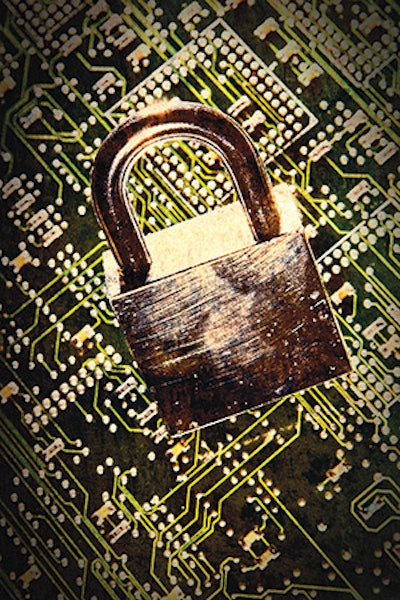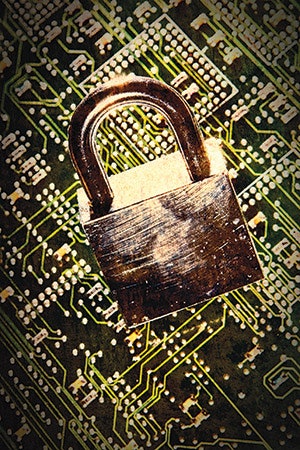

Quick. Easy. Efficient. What business doesn't love online banking? Be aware, though, of the danger: Hackers can access your account, drain your funds and threaten the survival of your business, and the risk is growing. Cyber attacks increased 24 percent in the first half of 2012 over the same period the previous year according to a report from security firm Symantec. The reason? "Any time the economy goes down, white-collar crime goes up," says Bill McDermott, CEO of Atlanta-based McDermott Financial Solutions.
And banks commonly refuse to indemnify companies for funds stolen from commercial accounts. "A lot of people have the misunderstanding that banks offer to business accounts the protection offered to consumers," McDermott says. "In fact, banks will not hold business account holders harmless for losses from cyber fraud."
Target: You
Think fraudsters only go after big corporations? Not so. "There seems to be a trend toward hackers targeting smaller businesses," says Brian Krebs, a cyber fraud investigative reporter in Washington, D.C. "Perhaps that's because larger businesses tend to have protective systems in place, so the bad guys have to jump through more hoops."
The numbers tell the tale: Some 36 percent of attacks during the first half of 2012 were directed at businesses with 250 or fewer employees, according to Symantec. That's a big spike from the 18 percent of the same period the previous year.
Secure Systems
Why won't banks protect business accounts? One reason is legislative: Only consumers are protected by the Federal Electronic Funds Transfer Act, also known as "Regulation E." If timely notice is given by the victimized consumer, almost all of the stolen money is reimbursed.
Banks expect business owners, on the other hand, to perform due diligence. "In the area of cybersecurity, banks expect businesses to possess a level of expertise higher than that of consumers," McDermott says. "Businesses are expected to maintain protection against malware and to train employees to avoid Internet sites where they can pick up viruses."
A cyber attack most often begins when a hacker installs a rogue program on the computer of a targeted business. Called "malware," this program captures usernames and passwords for the company's online bank accounts. From there it is an easy step for the hacker to access the account and wire funds to other financial institutions.
And here's the really bad news: Computers give little indication they are infected with malware. Programs designed to detect rogue programs are often unable to identify the code written to hack financial data. "Once on your system, sophisticated malware may keep itself patched faster than your antivirus software updates itself," Krebs says. As a result, the only way to really cure a sick computer is to re-install the operating system.
What to do? Even small businesses without IT staffs can take basic security steps. "Make sure your computers have virus protection and the appropriate firewalls," McDermott suggests. "From the business practice standpoint, if you send out ACH [automated clearing house] transactions, set up a system of dual control so that one person initiates the transaction and a second person approves it before the bank accepts it. And look at accounts on a daily basis to spot unauthorized transactions quickly."
Some experts suggest dedicating one computer solely to the task of online banking. Keep infections off the computer by prohibiting its use for email or for web surfing other than bank-related sites. "Strip down the computer to whatever software you need and nothing else," Krebs says. "And keep it up-to-date with the latest patches every day; don't fall behind."
Another thing to keep in mind is that hackers constantly write new programs that exploit vulnerabilities in software such as the Windows operating system, Java and Adobe Acrobat. Companies should also install the most up-to-date operating system, because each iteration provides better security. "According to recent reports, 43 percent of the market is still on Windows XP," says Stephen Sims, senior instructor at Bethesda, Md.,-based SANS Institute, a security training organization. "We all have to move off these outdated operating systems to take advantage of the much better security features of modern releases."
Good Habits
Modern operating systems can do only so much. Employees must be trained on good computing habits. Here are some of the best:
Avoid email attachments. "Three out of four malware attacks come from emails with links that are clicked on by recipients," Krebs says.
Surf safely. Undisciplined surfing can also be dangerous, points out Krebs. "Visit certain Web pages with a browser that is not fully patched and you can get infected by code in an ad banner or elsewhere on the page."
Navigate securely. When visiting your bank's website, use a bookmark that points to the institution's secure "https" page: https://www.bankname.com. Going to "www.bankname.com" can allow attackers to exploit your unencrypted connection.
Review bank statements. Monitor your monthly bank statement closely for unexplained financial activity. "Many attacks involve scraping small amounts from many accounts versus large amounts from a few accounts," Sims notes.
Go offline. When finished with a computer for the day, shut it down completely rather than putting it in sleep mode.
Vet Your Bank
Businesses are not always to blame when cyberfraud hits. Sometimes banks drop the ball. There is some motivation for financial institutions to maintain a certain level of security: Good internal practices are encouraged by government agencies charged with overseeing bank activities.
Even so, you will want to subject your own bank to some due diligence. "Perform risk assessments when evaluating potential banks," Sims suggests. "Draft a list of questions with your biggest concerns and run them by each organization." How do the bank's practices, and the security features it offers business accounts, compare with other institutions? For example, does it offer a two-step validation, in which an ACH transfer must be approved by a second representative at your office? There are other forms of what is called "multifactor authentication," in which the bank must receive a back-up confirmation from your business, in the form of a voice phone call or email, before honoring a wire transfer.
Sims suggests researching each prospective bank using publicly available tools such as Google, SEC, Dun & Bradstreet and others. "Analyze each bank's stock performance if publicly traded," he says. "Read through some of the comments in public message boards. Hint: Many of the posters are employees." Visit websites like www.darkreading.com to see if there are any reports regarding incidents at your prospective bank.
Big bank, small bank: Which is better? Each has its benefits. While all financial institutions are required to abide by federal regulations, larger banks may have more security resources and experience. However, smaller banks may have fewer accounts to monitor and may give each one more attention.
Since no banks of any size indemnify business accounts you may want to look into getting your own coverage. Ask your broker for information about fraud insurance with a rider for fraudulent bank transfers.
When Hackers Strike
Suppose, despite your best efforts and smart practices, a hacker siphons money from your account. Can you get any back? While it's highly unlikely that a victimized business will recover all of its stolen money, portions can often be saved. The secret to recovering your cash? Act fast. "Time is your enemy," Krebs says. "The longer the time that elapses since a breach, the more money you are likely to lose." Put together a list of vital financial and legal contacts and keep it handy. Quick action on your part, though, must be matched by your financial institution. Once your funds have been withdrawn as cash-often at overseas money transfer offices-they are gone for good.

































